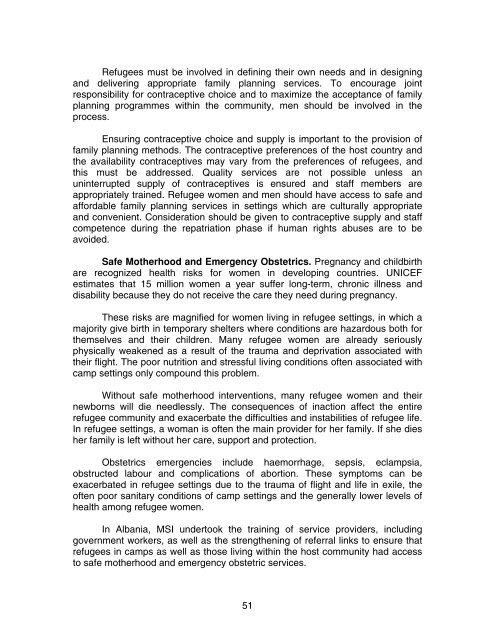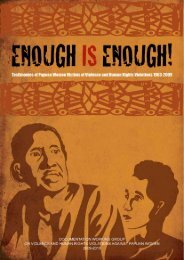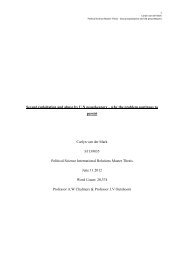The Impact of Armed Conflict on Women and Girls - UNFPA
The Impact of Armed Conflict on Women and Girls - UNFPA
The Impact of Armed Conflict on Women and Girls - UNFPA
Create successful ePaper yourself
Turn your PDF publications into a flip-book with our unique Google optimized e-Paper software.
Refugees must be involved in defining their own needs <strong>and</strong> in designing<br />
<strong>and</strong> delivering appropriate family planning services. To encourage joint<br />
resp<strong>on</strong>sibility for c<strong>on</strong>traceptive choice <strong>and</strong> to maximize the acceptance <str<strong>on</strong>g>of</str<strong>on</strong>g> family<br />
planning programmes within the community, men should be involved in the<br />
process.<br />
Ensuring c<strong>on</strong>traceptive choice <strong>and</strong> supply is important to the provisi<strong>on</strong> <str<strong>on</strong>g>of</str<strong>on</strong>g><br />
family planning methods. <str<strong>on</strong>g>The</str<strong>on</strong>g> c<strong>on</strong>traceptive preferences <str<strong>on</strong>g>of</str<strong>on</strong>g> the host country <strong>and</strong><br />
the availability c<strong>on</strong>traceptives may vary from the preferences <str<strong>on</strong>g>of</str<strong>on</strong>g> refugees, <strong>and</strong><br />
this must be addressed. Quality services are not possible unless an<br />
uninterrupted supply <str<strong>on</strong>g>of</str<strong>on</strong>g> c<strong>on</strong>traceptives is ensured <strong>and</strong> staff members are<br />
appropriately trained. Refugee women <strong>and</strong> men should have access to safe <strong>and</strong><br />
affordable family planning services in settings which are culturally appropriate<br />
<strong>and</strong> c<strong>on</strong>venient. C<strong>on</strong>siderati<strong>on</strong> should be given to c<strong>on</strong>traceptive supply <strong>and</strong> staff<br />
competence during the repatriati<strong>on</strong> phase if human rights abuses are to be<br />
avoided.<br />
Safe Motherhood <strong>and</strong> Emergency Obstetrics. Pregnancy <strong>and</strong> childbirth<br />
are recognized health risks for women in developing countries. UNICEF<br />
estimates that 15 milli<strong>on</strong> women a year suffer l<strong>on</strong>g-term, chr<strong>on</strong>ic illness <strong>and</strong><br />
disability because they do not receive the care they need during pregnancy.<br />
<str<strong>on</strong>g>The</str<strong>on</strong>g>se risks are magnified for women living in refugee settings, in which a<br />
majority give birth in temporary shelters where c<strong>on</strong>diti<strong>on</strong>s are hazardous both for<br />
themselves <strong>and</strong> their children. Many refugee women are already seriously<br />
physically weakened as a result <str<strong>on</strong>g>of</str<strong>on</strong>g> the trauma <strong>and</strong> deprivati<strong>on</strong> associated with<br />
their flight. <str<strong>on</strong>g>The</str<strong>on</strong>g> poor nutriti<strong>on</strong> <strong>and</strong> stressful living c<strong>on</strong>diti<strong>on</strong>s <str<strong>on</strong>g>of</str<strong>on</strong>g>ten associated with<br />
camp settings <strong>on</strong>ly compound this problem.<br />
Without safe motherhood interventi<strong>on</strong>s, many refugee women <strong>and</strong> their<br />
newborns will die needlessly. <str<strong>on</strong>g>The</str<strong>on</strong>g> c<strong>on</strong>sequences <str<strong>on</strong>g>of</str<strong>on</strong>g> inacti<strong>on</strong> affect the entire<br />
refugee community <strong>and</strong> exacerbate the difficulties <strong>and</strong> instabilities <str<strong>on</strong>g>of</str<strong>on</strong>g> refugee life.<br />
In refugee settings, a woman is <str<strong>on</strong>g>of</str<strong>on</strong>g>ten the main provider for her family. If she dies<br />
her family is left without her care, support <strong>and</strong> protecti<strong>on</strong>.<br />
Obstetrics emergencies include haemorrhage, sepsis, eclampsia,<br />
obstructed labour <strong>and</strong> complicati<strong>on</strong>s <str<strong>on</strong>g>of</str<strong>on</strong>g> aborti<strong>on</strong>. <str<strong>on</strong>g>The</str<strong>on</strong>g>se symptoms can be<br />
exacerbated in refugee settings due to the trauma <str<strong>on</strong>g>of</str<strong>on</strong>g> flight <strong>and</strong> life in exile, the<br />
<str<strong>on</strong>g>of</str<strong>on</strong>g>ten poor sanitary c<strong>on</strong>diti<strong>on</strong>s <str<strong>on</strong>g>of</str<strong>on</strong>g> camp settings <strong>and</strong> the generally lower levels <str<strong>on</strong>g>of</str<strong>on</strong>g><br />
health am<strong>on</strong>g refugee women.<br />
In Albania, MSI undertook the training <str<strong>on</strong>g>of</str<strong>on</strong>g> service providers, including<br />
government workers, as well as the strengthening <str<strong>on</strong>g>of</str<strong>on</strong>g> referral links to ensure that<br />
refugees in camps as well as those living within the host community had access<br />
to safe motherhood <strong>and</strong> emergency obstetric services.<br />
51




![IANSA [PDF, 2MB] - PeaceWomen](https://img.yumpu.com/25206379/1/190x123/iansa-pdf-2mb-peacewomen.jpg?quality=85)
![Commitments Sample [PDF, 93KB] - PeaceWomen](https://img.yumpu.com/25206331/1/190x245/commitments-sample-pdf-93kb-peacewomen.jpg?quality=85)










![A Toolkit for Advocacy and Action [PDF, 260KB] - Peace Women](https://img.yumpu.com/25205989/1/190x245/a-toolkit-for-advocacy-and-action-pdf-260kb-peace-women.jpg?quality=85)